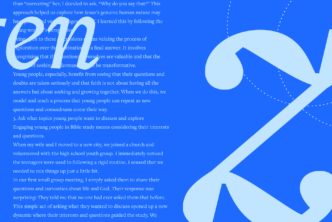When I was sixteen, I went to summer camp. But instead of mountains, sunrises, and songs around the campfire, this camp offered school desks, podiums, and hours of daily lectures. This was no ordinary summer retreat—this was a training ground for would-be apologists.
Led by experts on worldview, Christian leadership, and culture, this camp provided training for young Christians who wanted to know how to defend their faith—and I thrived in that environment. I was fascinated by the lectures and eagerly anticipated the next small group session, devotion, and worship session. At camp I was given tools to defend my faith, but as I tried to integrate them into my everyday life those tools eventually began to feel like weapons.
Beyond “us versus them”
My experience at that camp was valuable overall, but around that same time I began to develop an ”us versus them” perspective on the world. Although it wasn’t obvious from the outside, my interactions with non-Christians became fearful and aggressive. Though the camp leaders probably didn’t intend to teach this, I believed that if I just had a certain set of answers memorized, I could confound and convert even the most committed atheist.
The irony is that while I was confident I had The Truth and needed to convince The Unbelievers of all The Facts, I also was afraid. I knew people wouldn’t react well to the confrontational approach I thought I needed to take. Not only that, I was afraid I wouldn’t actually have all the answers when I needed them. The result? I did my best to be bold about my faith, but I often felt inauthentic. When I was sharing, I felt that deep down I had ulterior motives (proving that I was right), and when I wasn’t sharing, I still felt that I had ulterior motives (being liked by people).
Through years of discipleship and growth, I have learned some valuable lessons about giving a defense for my faith—lessons that have taken away both the aggression and the fear.
Relationships aren’t a means to an end
I used to approach “friendships” with non-Christians as secret missions; now I approach them as . . . friendships. Strangers and acquaintances aren’t targets, they’re people. I used to be afraid of being perceived as a salesman—and that fear was grounded. I really was befriending people hoping they would buy my message. People can tell when you’re being friendly just to sell them something, and no one likes that.
[Tweet “People can tell when you’re being friendly just to sell them something.”]Since I started relating to my non-Christian friends as human beings, I am more open to sharing my faith because I care about them. I’m genuinely interested in their lives, and I want them to hear about the joy, peace, and hope of knowing God.
I don’t have all the answers, and that’s ok
Bobby Conway says it best in his Mobile Ed course on apologetics: “You don’t have to know everything about everything, right? You can’t. It’s impossible. . . . We need to, first and foremost, understand our own Christian doctrines, and then when we seek to learn about other faiths. We just want to know where they differ on their main doctrines compared to ours.”
I don’t have to memorize everything about every faith to be an effective apologist. In fact, some of the most powerful conversations I’ve had with people of other faiths have taken place when I have asked them about things I don’t know or understand about what they believe.
I don’t have to memorize everything about every faith to be an effective apologist. Share on XA few years ago I was traveling on a train from London. Planning to spend my two-hour journey writing, I pulled out my journal. But the man next to me would have none of it and unrelentingly engaged me in conversation. (Sometimes the Holy Spirit makes it very clear that I am not welcome to hide in my own little space, however much I want to!)
Reluctantly, I began asking the man about himself. The topic of conversation quickly turned to faith, and I discovered he held a view of Jesus I had never heard before. Intrigued, I continued to ask questions and to share my own beliefs. We spent two hours discussing what the Bible says about Jesus! This was only possible because I was willing to admit what I didn’t know—and because I continued the conversation even though I didn’t have all the “right” answers memorized.
Only God can change people
Even if we share the most reasonable arguments for Christianity, and even if we do that with the utmost “gentleness and respect” (1 Pet 3:15), people may still disregard what we have shared. The sobering fact is, we don’t have the power to change hearts; God does.
We don't have the power to change hearts; God does. Share on XBut this is also wonderfully freeing. Even if from the outside it looks as though our words are ineffective, God can still grow every seed that has been planted at any time he chooses. We are certainly called to “always be prepared to make a defense” (1 Pet 3:15), but God is the one who does the real work of convincing people of the truth. When we trust God to call people to himself, it dismantles the fear and aggression. All of a sudden, the tools of apologetics no longer feel like weapons.
Get the training you need to defend your faith, without the fear and aggression: Bobby Conway’s Introduction to Apologetics course will show you how to winsomely, lovingly, and rationally give a defense for the hope within you. Learn the fundamentals of apologetics from one of our most engaging contemporary apologists.
Related articles:





